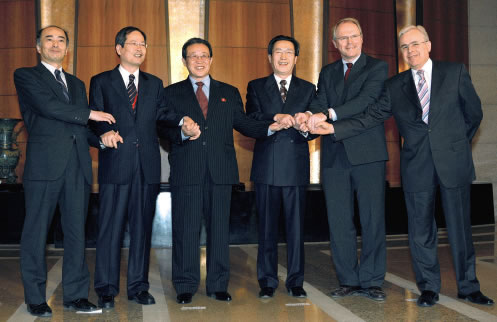2 International Developments and Japanese Diplomacy in 2006
Ensuring Security of Japan and the World
The year 2006 was marked by incidents constituting a serious threat to Japan's peace and security.
On July 5, North Korea launched seven ballistic missiles, including a Taepodong II missile, and on October 9 announced that it had conducted a nuclear test. Japan swiftly responded to these provocative actions. Immediately after the missile launch, the Chief Cabinet Secretary issued a statement that this incident was a matter of grave concern including from the viewpoint of the security of Japan and the peace and stability of the international community, and Japan announced measures including the banning of the North Korean cargo-passenger ship Mangyongbong-92 from entering into Japanese ports as well as the increased stringency in immigration screening for North Korean nationals. In addition, Japan made proactive diplomatic efforts as a non-permanent member of the United Nations Security Council, which resulted in the July 16 adoption of United Nations Security Council Resolution 1695 condemning the missile launches. In the case of North Korea's announcement of a nuclear test, the Chief Cabinet Secretary announced that Japan simply could not tolerate North Korea's announcement and Japan adopted measures such as banning all North Korea-flagged vessels entry into Japanese ports, the banning of all imports from North Korea, and the barring North Korean national's entry into Japan in principle. In response to this nuclear test proclaimed by North Korea, Japan made assertive diplomatic efforts towards Security Council members as the Council Presidency which resulted in the adoption of Resolution 1718 on October 15. This resolution set forth measures to be taken by both North Korea and other UN member states. The Second Session of the Fifth Round of the Six-Party Talks in December marked a resumption of talks after 13 months. While this session resulted in no concrete achievements, at the Third Session, held in February 2007, a document was adopted in which North Korea agreed to shut down and seal the Yongbyon nuclear facility and take other actions, marking a first step toward the non-nuclearization of the Korean Peninsula. Japan has also been requesting the safe and immediate return of the abducted Japanese nationals as well as a full accounting of the victims and the hand over of those responsible for the abductions. However, the abduction issue has not been resolved.
As for other outstanding issues in East Asia, the modernization of military forces and the growth in national defense expenditures by China remain lacking in transparency. Relations across the Taiwan Strait, marked by progress in economic relations and people-to-people exchanges on one hand and an ongoing atmosphere of instability on the other, continue to merit careful observation.
Japan, as a nation which possesses no nuclear weapons, has been furthering its efforts to achieve global nuclear disarmament and non-proliferation. International society now faces critical challenges such as the North Korean and Iranian nuclear issues, and Japan, too, is engaged in efforts towards the resolution of these issues.

Six heads of delegation shaking hands at the 3 rd session of the 5 th Round of the Six-Party Talks
(February13, 2007, Beijing; Photo: Kyodo)
In 2006 energy security was a topic that attracted very active discussion. It is an issue of vital importance for Japan insofar as Japan is unable to secure sufficient energy resources domestically. It was also one of the main topics discussed at the G8 Summit held in Russia. Russia had taken measures such as halting its supply of natural gas and implementing price hikes to the Ukraine and Georgia, countries placing greater value on their relationships with EU member countries. This situation raised concerns among EU member countries, as they depend on Russia to meet part of their energy needs. In addition, while pipelines for petroleum and natural gas are now under construction mainly in Central Asia and the Caucasus, various new route configurations have been proposed and rivalry is becoming apparent among the countries concerned with regard to setting new routes of the pipelines. As Russia's partner in promoting multiple energy-related projects, Japan calls on Russia to fulfill a responsible role as an energy-supplying nation.
With regard to global infectious disease issues, there is a growing threat of avian influenza being transmitted to humans in increasing numbers and a new strain of influenza developing. Japan has reinforced its domestic efforts with regard to preventive measures and safety precautions and intensified its cooperation internationally in these areas.